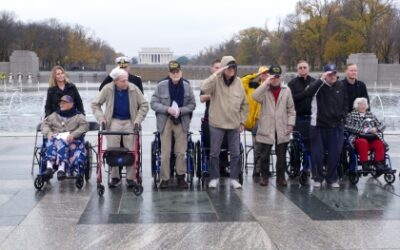I was saddened to learn of the passing of first lady Rosalynn Carter. She and President Jimmy Carter were a leading political team during a particularly turbulent time in America. Although the Carter presidency was marred by the energy crisis of 1979 and the Iran hostage crisis, which likely limited Carter to one presidential term, the husband-wife team had a remarkable list of accomplishments during their four years at the White House. Carter made some difficult and unpopular decisions during his presidency. He pardoned all Vietnam War draft dodgers, returned the Panama Canal, established the Departments of Energy and Education and shepherded, arguably, the most significant talks regarding Middle East peace through the Camp David Accords.
No Racial Differences in DLBCL Treatment Within VA Healthcare System
No statistically significant racial differences in diffuse large B-cell lymphoma (DLBCL) outcomes were found for patients treated within the VHA, according to recent research.
Very Elderly Patients Fare Much Worse When Treated for DLBCL
Diffuse large B-cell lymphoma (DLBCL) becomes much more difficult to treat in older patients, according to a new study suggesting that more adults of advanced age be included in clinical trials for new agents.
Despite Disparities, Making a Difference for Veterans With Relapsed DLBCL
DURHAM, NC—Recent Food and Drug Administration approvals of chimeric antigen receptor (CAR) T cell therapies and novel immunotherapies have helped to significantly improve outcomes for patients with relapsed and refractory diffuse large B cell lymphoma (R/R DLBCL)....
More Diverse Dataset Raises Questions about MGUS Risk Models
Patients with monoclonal gammopathy of undetermined significance (MGUS) have been thought to have a less than 1% chance of progressing to multiple myeloma as long as their M-protein levels are below 1.5 g/dL.
Lower Relapse Rates Suggest Limited Value for Prophylaxis in DLBCL
Up to 40% of patients with diffuse large B-cell lymphoma (DLBCL) relapse or progress following first-line chemoimmunotherapy.
For CLL, BTK Inhibitors Appear to Extend Time to Next Line Most
JACKSONVILLE, FL—As treatment options for chronic lymphocytic leukemia (CLL) multiply, physicians face an increasing array of sequencing options but have little guidance from clinical trials of the most effective order given each patient’s specific disease...
All WWII Veterans Now Eligible for No-Cost VA Care, Including Long-term Care
All World War II veterans now are eligible for no-cost VA healthcare, medical services and nursing home care, the VA announced shortly before Veterans Day.
Knowing Seasonality of Wartime Wound Infections Can Aid Effective Treatment
Battlefield-related wound infections complicate recovery from combat casualties. A new study described what pathogens are more likely to cause morbidity at what times of the year to help better manage the infections.
New Factbook Reveals Veteran Trends, Including Mental Health, Labor Market
U.S. military veterans are declining as a percentage of the population and are, on average, older, more likely to be male and less racially or ethnically diverse than the overall nonveteran population, reports a new factbook that sheds light on demographics, mental health and labor market outcomes.
Surgery Is Better Treatment for Primary Aldosteronism
Even though primary aldosteronism (PA) is one of the most common causes of secondary hypertension, the comparative outcomes of targeted treatment often are unclear.
Consensus Documents Answers Some Questions on Carotid Stenosis
Many national/international guidelines provide recommendations on management of patients with asymptomatic (AsxCS) and symptomatic (SxCS) carotid stenosis. Several questions remain unanswered, however, according to a new report.
SMART2 CABG Risk Score Performs Well in Racially Diverse VA Cohort
A new study tested the potential of the Secondary Manifestations of Arterial Disease (SMART2) risk score for use in patients undergoing coronary artery bypass grafting (CABG).
Fate of VA’s Whistleblower Protection Office Under Legislative Discussion
Should VA’s Office of Accountability and Whistleblower Protection (OAWP) be given more authority in order to better conduct investigations and track enforcement recommendations, or should it be done away with entirely?
Psychedelics to Treat PTSD Now Getting Bipartisan Congressional Support
After decades of being considered fringe science by lawmakers, research into psychedelics for the treatment of post-traumatic stress disorder (PTSD) is finding bipartisan support in Congress.
VA’s Research Portfolio Suffers From Lack of Focus, Critics Maintain
VA’s research portfolio has slowly but steadily grown larger year after year. Nearly every major piece of legislation impacting VA includes provisions requiring the department to conduct research, whether it be on toxic exposure, mental health, suicide or other high-profile issues affecting veterans’ health.
VA Will Fund Medical Residencies in Underserved Areas Across the United States
In an effort to improve healthcare access for veterans in rural, trial and underserved areas across the United States, the VA is creating a new pilot program for graduate medical education.
Thyroid Cancer More Common Among Transgender Female Veterans
Transgender female veterans appear to have a high prevalence of thyroid cancer, according to a recent study that might be the first to demonstrate such a disparity in that cohort.
COVID-19 Cases Were Undercounted Early in Active-Duty Servicemembers
The number of reported COVID-19 cases in active-duty U.S. military members was considerably lower than true cases during the first 18 months of the COVID-19 pandemic, according to a recent study, which used severe acute respiratory syndrome coronavirus 2 (SARS-CoV-2) seroprevalence data to reveal the gap
MHS Patients Receive Earlier Cancer Diagnoses Than General U.S. Population
Cancer patients treated within the MHS generally receive their diagnoses earlier than members of the general U.S. population covered by employee-provided insurance, Medicaid or without insurance.
Apixaban Suggested as Better OAC for Frail Older Adults With AF
Past research has suggested that elderly veterans who are frail are less likely to be prescribed oral anticoagulants for atrial fibrillation (AF). A recent study suggested a possible way to mitigate some of those challenges.
Usability Testing to Identify Deficiencies, Improve Efficiency in EHR Transition
For healthcare systems changing over from one electronic health record (EHR) system to another—such as the VA’s transition from its legacy EHR system to Oracle Cerner EHR modernization program—the transition poses many challenges, including an impact on medication safety.
A Review of Long-Acting Injectable Antiretroviral Therapy
Barriers to maintaining viral suppression remain a challenge to ending the HIV epidemic. Among those are medication adherence.
Healthcare Facilities Must Be Prepared to Handle Simultaneous Stressors
Healthcare systems are often required to navigate external stressors, such as policy changes, natural disasters and emerging infectious diseases, which can disrupt patient care.
Reduction in Mandated Military HIV Checkups Did Little Harm
Nearly a decade ago, in 2014, the U.S Air Force reduced the frequency of mandated HIV medical evaluation visits from every 6 months to every 12 months. The goal was to improve military readiness.
HIV Often Comorbid With Substance-Use Disorder Within VHA
HIV prevalence, which was elevated in all substance-use disorder patients at the VHA, was highest among veterans with alcohol- and opioid-use disorders (AUD/OUD), with disparities by race/ethnicity and age, according to a new study.
Gulf War Illness Reduces White Blood Cells’ Ability to Make Energy
The ability of white blood cells to make energy is significantly reduced in Gulf War Illness (GWI), which affects approximately 250,000 U.S. veterans, according to a new study finding a measurable biochemical difference in veterans who have the disease.
CRC Screening Levels Too Low for Veterans With Anemia, Hematochezia
Already the second-leading cause of cancer death in the United States, colorectal cancer (CRC) is increasing in adults younger than 50. Early-age onset CRC (EAOCRC) is often diagnosed at later stages, which require more intense treatment, according to a new study.
VA Celebrates 20 Years of Telehealth With Continued Expansion of Services
The VA launched its national telehealth services program in 2003. Twenty years later, it continues to look for new ways to break down barriers to care and expand services available to veterans from the comfort of their homes by tapping into services offered by industry leaders as well as developing internal capabilities.
Veterans’ Disinhibited Behaviors Linked to Range of Physical, Mental Conditions
Behavioral disinhibition is an externalizing (EXT) disorder common with many psychiatric conditions. Recent genome-wide association studies (GWASs) have demonstrated the overlap between EXT disorders and important aspects of veterans’ health, such as suicide-related behaviors and substance-use disorders (SUDs).




